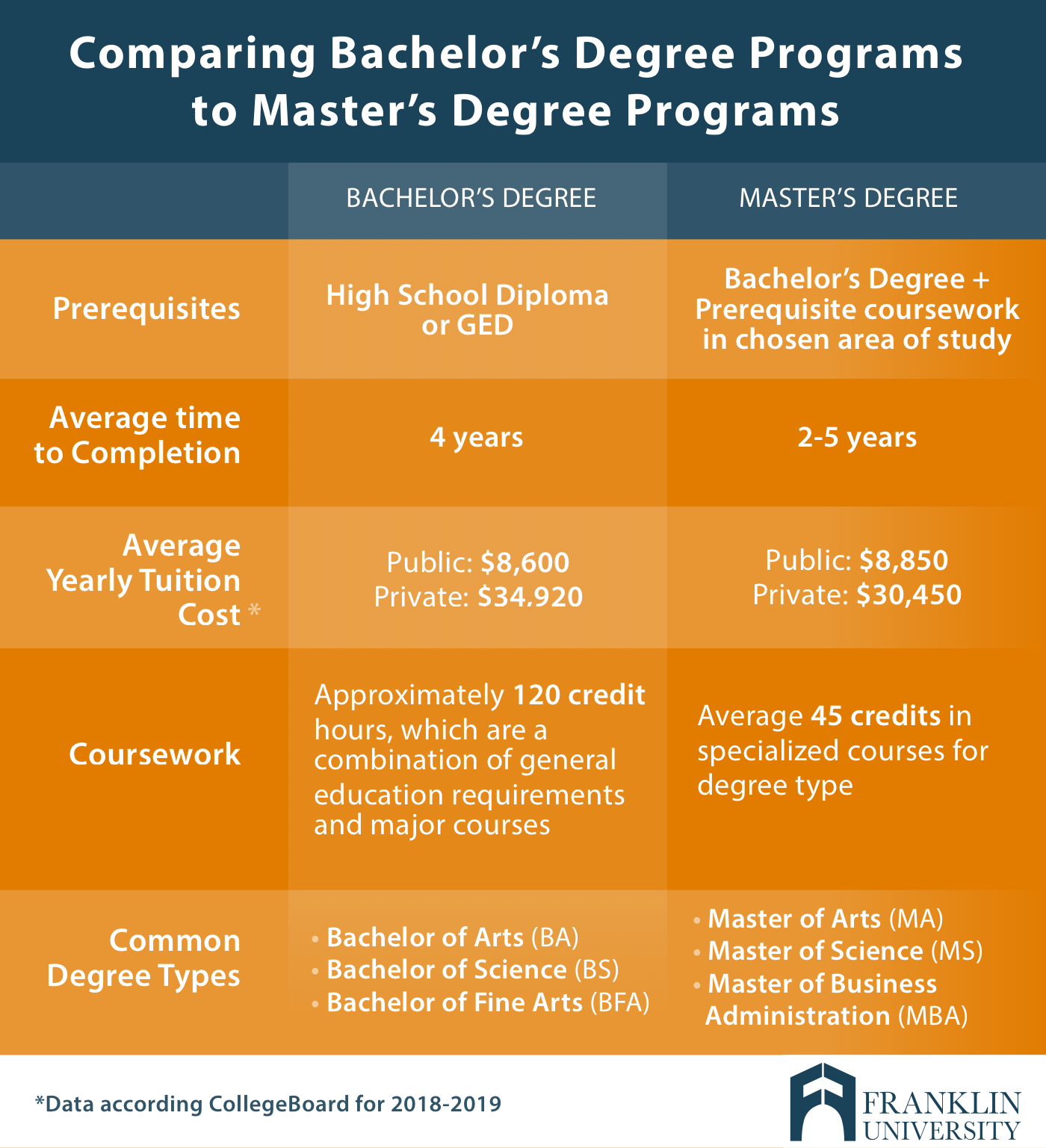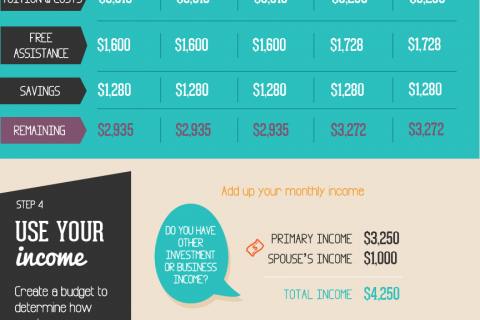Request Information
We're Sorry
There was an unexpected error with the form (your web browser was unable to retrieve some required data from our servers). This kind of error may occur if you have temporarily lost your internet connection. If you're able to verify that your internet connection is stable and the error persists, the Franklin University Help Desk is available to assist you at helpdesk@franklin.edu, 614.947.6682 (local), or 1.866.435.7006 (toll free).
Just a moment while we process your submission.

Bachelor’s Degree vs. Master’s Degree: What’s the Advantage?
Qualifying for many top jobs requires a degree. While in some industries, associate degrees and certifications can get you in the door and help you secure entry-level positions, investing in a bachelor’s degree or master’s degree can provide both short- and long-term benefits for your career advancement.
We want you to feel informed and empowered when choosing a degree program. Let’s start with a simple question—what’s the difference between a bachelor’s degree and a master’s degree? And how can you benefit from one, the other or both?
What’s the Difference Between a Bachelor’s Degree and a Master’s Degree?
What are some of the key differentiators between a bachelor’s degree and a master’s degree? Let’s take a high-level look at the differences in these two degree programs.

Which Degree is a Better Fit—Bachelor’s or Master’s?
Choosing a degree program is a significant commitment. We want to help you understand which program is the best fit based on your background and career aspirations.Your educational background is the first place to start when considering a degree program.
You may be a good fit for a bachelor’s degree program if:
- You haven’t completed any post-secondary education
- You completed some college coursework, but didn’t graduate with a degree
- You graduated from an associate degree or certificate program
- You graduated with your bachelor’s degree but want to pursue a career or master’s degree in a completely different field
If you already completed a bachelor’s degree program, getting your master’s degree may be the most beneficial next step in terms of salary expectations and career advancement.
You may want to pursue a master’s degree program if:
- You’re looking to switch careers and improve job prospects
- You want to advance to executive-level positions or other jobs that require a master’s degree
- You want to update your industry knowledge and improve job security
- You want to gain a deeper understanding of your field and increase your expertise in specific areas
These are just some of the reasons you may decide to pursue one degree over another. You should consider the total value of the degree and how it improves your career prospects, both now and in the long term when choosing a program.
But is it too difficult to go back to school? There are many myths about adults continuing their education, so we want you to understand the full picture when it comes to earning a degree.
When it comes to paying for school, grants are among your best options. But do you know how to find them? Remove the guesswork by downloading this free guide
Dispelling Myths About Getting Your Degree as an Adult
Pursuing a degree may not be as difficult as you think. While it’s true you’ll need to be focused and dedicated, no matter what program you pursue, we don’t want you to believe common misconceptions about completing a degree as an adult. Let’s clear up these myths with the realities of returning to school.
Myth 1:You have to start from scratch.
The Truth: If you choose the right program, you can get transfer credit for your previous experience. Not only can you get credit for previously completed college coursework and associate degrees or certificate programs, with transfer-friendly institutions like Franklin University, you can get credit for your professional experience as well.
Explore Franklin University’s wide range of transfer credit opportunities to see how you can save on tuition and complete your degree faster.
Myth 2:You won’t qualify for financial aid.
The Truth: You don’t have to be a first-time college student to apply for financial aid. Not only can you qualify for financial aid, you may actually qualify for more aid.
When you apply for financial aid as a dependent student, your parents’ income is what’s taken into consideration. As an adult, your income (and your spouse’s income if you’re married) is what determines your eligibility and amount of aid. You may also qualify for better loans as an adult or have the opportunity for tuition reimbursement through an employer. No matter what, you should always complete a FAFSA when going back to school.
Myth 3:You have to take standardized tests again.
Truth: Many institutions waive standardized test requirements for people over age 25. For many adults, you won’t need to complete any additional tests to apply for a program. When looking for programs, make sure you understand their admission requirements. Many programs designed for adults make the application process as simple as possible.
Don’t Believe These Myths About Master’s Degrees
Now let’s look at master’s degree programs and some of the unfounded reasons people may question completing their master’s degree.
Myth 1: You can only complete my master’s degree in the same field as your bachelor’s degree.
The Truth: As long as you have a bachelor’s degree and have completed the prerequisite coursework, you can get any master’s degree you want.
If you’re looking to change careers or gain new skills, don’t assume you need to start over. Many master’s programs are structured so that courses build on one another. In other cases, necessary prerequisite knowledge can be acquired through a bridge course taken prior to beginning master’s-level study.
From english majors to engineers, MBA programs arm you with the business skills to excel in any industry. For professional degrees or specialized programs, like the sciences, you may need to take prerequisite courses, but that doesn’t necessarily mean you need to complete another undergraduate degree.
Myth 2:Getting your master’s degree is too expensive, it’s not really worth it.
The Truth: Yes, there’s a monetary investment in getting your master’s. But when looking at cost you should consider your return on investment, not just the dollar amount for the degree.
We won’t pretend that a master’s degree is inexpensive, but what you pay now will pay off in the future. If your master’s degree program requires 36 hours of coursework, and the cost per credit hour is $670, as it is at Franklin University, you would spend $24,120 on your degree. That’s less than the average new car. And unlike a car, your education will serve you for a lifetime.
Even more importantly, take your earning potential into account. On average, master’s degree holders make $228 more a week, which is $11,856 more per year, than the average bachelor’s degree holder. In the long run, a master’s degree can more than pay for itself.
Myth 3:Going back to school is inconvenient.
The Truth: If you choose the right program, you won’t have to jump through hoops to apply. If you’re worried about your past academic performance, or taking entrance exams, many online degree programs take more of a big-picture approach in accepting students. These types of programs also make it easier to balance your coursework with your other obligations.
For example, Franklin University master’s programs take a complete look at your experience, not just your undergraduate grades or test scores to admit students. And once you’re admitted, online courses make it easier to dedicate time to be successful because you can work around your schedule.
What’s the Value—Comparing Bachelor’s Degrees and Master’s Degrees?
If you’re planning to go back to school, you want to understand the true value of earning your degree. Let’s look at common professions to see the earning potential for professionals with a bachelor’s degree and master’s degree.

As you can see, the more advanced your education, the higher your earning potential. While it’s a significant amount year over year, let’s look at how higher education can impact your lifetime earning potential according to the U.S. Census Bureau.

The value of a higher education degree is indisputable. But how do you choose the right program to make sure you’re maximizing your return on investment?
Choosing a Degree Program—What You Should Look For
If you’re a working professional and don’t want to quit your job to return to school, there are key elements to look for in programs to not only make it easier to get your degree, but add educational value as well.
- Transfer credit friendly institutions: Make sure you get credit for all of your previous experience to help reduce time to degree and cost of your education.
- Flexible degree programs: Online programs make it easy to fit earning your degree into your schedule.
- Interactive coursework: Even if your program is online, cutting-edge interactive learning tools can create a community with your classmates and give you useful experience.
- Faculty with real-world experience: Learning from faculty who understand your industry’s landscape can help you take theory and put it into practice.
- Networking opportunities: Take your experience beyond the coursework by connecting with other professionals in your field who can help advance your career.
Whether you’re pursuing your bachelor’s degree or master’s degree, you want to make sure you’re getting the most out of your program.
Explore Franklin University’s bachelor’s programs to see what degrees and majors we offer that will give you these benefits and more. If you’re ready to pursue your master’s degree, explore Franklin University’s master’s programs to take your education to the next level and advance your career.





